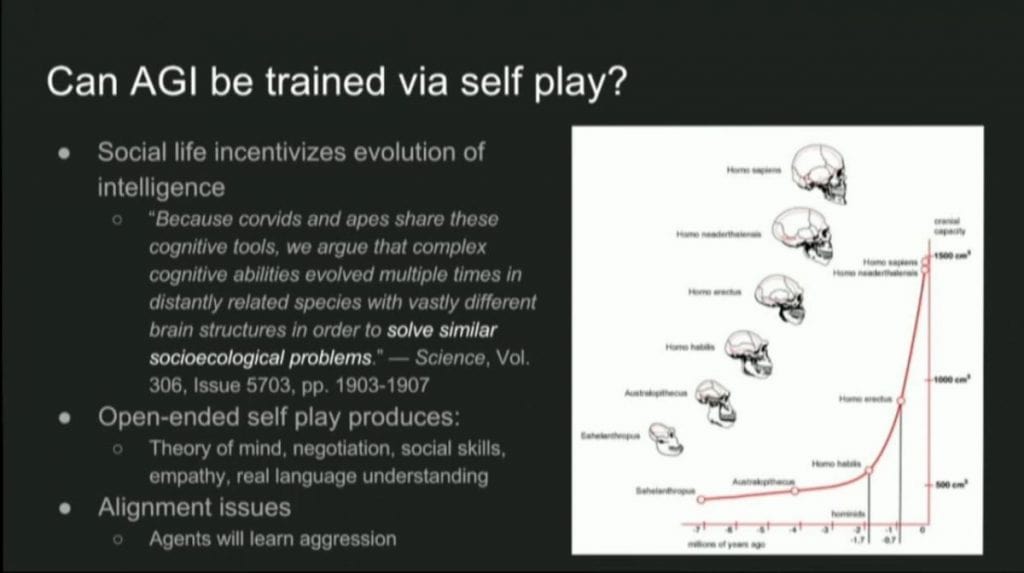From Minecraft to Cognitive Mastery: OpenAI’s GPT Models Redefine Learning


In Brief
The article explores the relationship between social environments and cognitive development in AI research, arguing that a socially enriched context contributes to the evolution of larger brain size and enhanced cognitive skills.
In a thought-provoking article published by the esteemed journal TowardsDataScience, an exploration into the potential relationship between social environments and the development of complex cognitive abilities is conducted. The article delves into the argument that a socially enriched context contributes to the evolution of larger brain size and enhanced cognitive skills.

| Related: OpenAI’s Chief Scientist, Ilya Sutskever, Sheds Light on the Future of AGI and Neural Networks |
Ilya Sutskever reflected on this topic in his report delivered five years ago. He candidly expressed his 75% confidence in the stated thesis, alongside a playful remark that scientific literature seemingly supports a wide array of assertions.
Sutskever’s discourse revolves around the capacity of agents, encompassing both general reinforcements learning agents and those based on language models. He examines their ability to grow, learn, and thrive within social environments, wherein multiple agents coexist, each potentially pursuing similar objectives.
By drawing parallels with human societal interactions, Sutskever highlights the notion that communal living engenders the acquisition of social skills, theory of mind, negotiation acumen, and a comprehensive comprehension of desires within a community. However, he also underscores the learned presence of aggression within these environments.
The dynamic becomes intricate as agents must consider not just their own priorities, but also navigate interactions with other agents, leading to the formulation of intricate behavioural patterns.
The Correlation Between Social Environment and Cognitive Development

A compelling exploration emerges: What if several distinct GPT (Generative Pre-trained Transformer) models were introduced to interact within a common environment, each provided only with a high-level task description? This technique has yielded remarkable success in diverse domains, such as machine learning’s mastery of Go, and OpenAI’s own achievement of training bots for DotA 2.
The pivotal objective centres on the concept of generalization, or even more intriguingly, meta-learning — a skill to acquire the aptitude for learning. This would empower AI entities to comprehend novel and uncharted tasks, a milestone promising immense possibilities.
In a promising trajectory for AI, the evolution of these models is bounded only by computational power. The augmentation of hardware resources for facilitating model communication and training expedites their developmental journey. The paradigm is exemplified by OpenAI’s current ability to orchestrate the simultaneous execution of thousands of models. This notable stride in capacity might be linked to their recent acquisition of a Minecraft-like analogue developer.
In the realm of AI research, the interplay between social environments, cognitive evolution, and the fostering of learning abilities unfolds as an intriguing avenue, and it is the cumulative efforts of luminaries like Ilya Sutskever and institutions like OpenAI that fuel these progressive explorations.
Read more about AI:
Disclaimer
In line with the Trust Project guidelines, please note that the information provided on this page is not intended to be and should not be interpreted as legal, tax, investment, financial, or any other form of advice. It is important to only invest what you can afford to lose and to seek independent financial advice if you have any doubts. For further information, we suggest referring to the terms and conditions as well as the help and support pages provided by the issuer or advertiser. MetaversePost is committed to accurate, unbiased reporting, but market conditions are subject to change without notice.
About The Author
Damir is the team leader, product manager, and editor at Metaverse Post, covering topics such as AI/ML, AGI, LLMs, Metaverse, and Web3-related fields. His articles attract a massive audience of over a million users every month. He appears to be an expert with 10 years of experience in SEO and digital marketing. Damir has been mentioned in Mashable, Wired, Cointelegraph, The New Yorker, Inside.com, Entrepreneur, BeInCrypto, and other publications. He travels between the UAE, Turkey, Russia, and the CIS as a digital nomad. Damir earned a bachelor's degree in physics, which he believes has given him the critical thinking skills needed to be successful in the ever-changing landscape of the internet.
More articles

Damir is the team leader, product manager, and editor at Metaverse Post, covering topics such as AI/ML, AGI, LLMs, Metaverse, and Web3-related fields. His articles attract a massive audience of over a million users every month. He appears to be an expert with 10 years of experience in SEO and digital marketing. Damir has been mentioned in Mashable, Wired, Cointelegraph, The New Yorker, Inside.com, Entrepreneur, BeInCrypto, and other publications. He travels between the UAE, Turkey, Russia, and the CIS as a digital nomad. Damir earned a bachelor's degree in physics, which he believes has given him the critical thinking skills needed to be successful in the ever-changing landscape of the internet.























































